We include products in articles we think are useful for our readers. If you buy products or services through links on our website, we may earn a small commission.
Is Honey Good for You? What the Science Says

Table of Contents
Honey is delicious, nostalgic (that adorable bear) and an ancient part of the human diet, but is honey good for you?
Though often marketed as a healthy sugar alternative, critics claim that honey is just another added sugar.
Let’s take a closer look at what the science has to say.
A Brief History of Honey
Human’s relationship with honey is older than written history. The most ancient account of honey is found on an 8000-year-old Spanish rock painting depicting a person collecting honey.

Image from wikipedia.org
Honey is mentioned in Sumerian and Babylonian writings, the Hittite code, and sacred writings in India dating from 2100 B.C.
The word honey comes from the English “hunig” possibly derived from an ancient Sanskrit word for “golden”. Not surprisingly, honey was the first and most widespread sweetener used by humans. It’s been valued and used as currency, tribute, and sacred offering.
Honey even makes some memorable cameos in the bible. There’s the famous description of Israel as the “land of milk and honey”. It’s said that St. John the Baptist sustained himself on a diet of honey and locusts. And honey figures in Solomon’s advice to his son: “eat honey; it is good.”
But is it? Let’s find out…
What is Honey?
Honey is a thick, sweet syrup made by honey bees from the nectar they gather from flowers.
There are many different types of honey determined by the types of flowers the nectar is sourced from. Common flower sources include:
- Alfalfa honey
- Manuka honey
- Wildflower honey
- Orange blossom honey
Honey is also categorized by the way it is processed. Conventional honey is highly filtered, pasteurized, and often adulterated with high fructose syrups. Organic honey limits pesticides, but is also most often pasteurized. And raw honey is unpasteurized and generally less filtered.
Nutrient content
Honey is a high-calorie, high carbohydrate food with only trace amounts of micronutrients.
One tablespoon of honey contains:
- Calories: 64
- Protein: 0 grams
- Fat: 0 grams
- Carbohydrates: 17 grams
- Fiber: 0 grams
- Sugar: 17 grams
As you can see honey is primarily carbohydrate, consisting of simple sugars in the ratio of 40% fructose and 30% glucose. The remainder of honey consists of water, pollen, and minerals including magnesium and potassium.
Honey closely resembles table sugar which is 50 percent fructose and 50 percent glucose. The 64 calories per tablespoon in honey is higher than sugar’s 49 calories per tablespoon.
How is Honey Made?
Honey is made in an intricate process that begins with honey bees working hard to collect pollen from flowers.
Back at the hive, the nectar they’ve collected is passed mouth-to-mouth from one worker bee to another. Each bee adds enzymes that break down the pollen while giving it antifungal and antibacterial properties.
Bees then store this honey as a source of simple sugars (glucose and fructose) in wax honeycombs inside beehives. The bees fan the honey with their wings, circulating the air and directing natural heat that evaporates away water. Then they cover it with beeswax.
If the hives are man-made, the honey accumulates on a structure called a frame. Honey frames are harvested in the summer and the honey is isolated and strained.

Conventional Honey
Most of the honey you see in standard grocery stores has been filtered and pasteurized.
Pasteurization means it has been heated to high temperatures to kill natural yeasts. Pasteurization gives honey a longer shelf life while keeping it from “crystallizing.” This makes it more appealing to most people uninitiated into the relative benefits of raw honey.
Conventional honey has no pollen
Processing with heat and ultrafiltration can completely remove bee pollen from honey. An unofficial study looking at 60 samples of conventional honey found over 75% had no pollen.
This is an issue because bee pollen is responsible for many of the beneficial amino acids, micronutrients, and antioxidant properties that can be found in honey.
Most Conventional Honey is Imported
Honey is so popular that American producers cannot meet demand. Around 70% of the honey sold in the U.S. is imported. The prevalence of imported honey from countries without sufficient oversight has led to legitimate concerns that imported honey is adulterated with high fructose corn syrup and other sweeteners.
The Bottomline on Conventional Honey
Conventional honey, stripped of any of its amino acids, antioxidants, and probiotic compounds, is essentially just sugary syrup. High intake of added sugars contributes to numerous health problems including:
- Insulin resistance
- Increased stress hormones
- Mineral depletion
- Depletion of antioxidants
- Increased inflammation
To learn more about the dangers of sugar click here
Organic Honey
For honey to be organic it must be produced at bee farms meeting USDA guidelines. The bees, flowers, and honey are theoretically not allowed to come in contact with pesticides, chemicals, and other factors that violate these rules.
However, because bees fly, there is essentially no way to completely control contaminated honey.
Furthermore, there are no rules against pasteurizing and processing organic honey. For U.S. honey makers this means that organic honey is often put through the same processes as conventional honey.
The Bottomline on Organic Honey
If you consume a Standard American Diet high in carbohydrates, or if you are attempting to reduce calories and added sugars, organic honey is most likely not good for you.
Similar to conventional honey, processed organic honey is essentially just sugary syrup.
That said, choosing organic honey over conventional is a marginally better choice. But any real benefits of honey are found in raw unfiltered varieties.
Raw Honey
Raw honey, the kind you find at most farmers’ markets and health food stores, is not heated and often minimally filtered.
The nutrients in raw honey include:
- 22 amino acids,
- 31 different minerals
- Trace amounts of vitamins and enzymes
Antioxidants in Raw Honey
Raw honey contains around 30 types of plant compounds that have antioxidant properties.
A study comparing antioxidants in raw and processed honey from a local market found that raw honey contained up to 430% more antioxidants than conventional honey.
Studies have linked the antioxidants in honey with numerous benefits including reduced risk of heart disease, reduced inflammation, and defense against certain cancers.
Therapeutic Uses of Raw Honey
Human studies have found that raw honey has other therapeutic benefits including:
- Improved healing of wounds due to its antibacterial properties
- Alleviation of diarrhea and regeneration of the mucosal lining of the intestines when diluted at 5%
- Alleviation of skin ailments including herpes, psoriasis, and dermatitis when applied topically
- Cold relief: The World Health Organization (WHO) and the American Academy of Pediatrics recommend honey as a natural cough remedy. A 2007 study by Penn State suggested honey reduced nighttime coughing and improved sleep quality in children
- Heartburn relief: Honey may be effective at treating heartburn, according to research reported in the BMJ
- Antibacterial agent: Honey contains the protein defensin-1, which has the ability to kill bacteria.
Note that each of these uses is either external or in a very diluted form.
Raw Honey and Heart Health
Replacing regular sugar with raw honey may reduce some heart disease risk factors.
In animal studies raw honey has been shown to reduce oxidative stress and improve cholesterol levels associated with heart disease.
One study comparing table sugar and honey in 55 people found that honey helped decrease “bad” LDL cholesterol levels, increase “good” HDL cholesterol, and reduce triglyceride levels by 19%.
Honey vs. Refined Sugar
Honey is higher than sugar in calories, but in its raw form honey provides antioxidants and trace minerals that are absent in refined sugar.
Honey vs. Refined Sugar for Diabetics
A study looking at 48 people with type 2 diabetes found that honey increased blood sugar levels, though not to the same degree as refined sugar.
Another study looking at type-2 diabetics found that when compared with table sugar honey improved markers associated with heart disease. It reduced LDL cholesterol and inflammation, while raising “good” HDL cholesterol.
It should be noted that though honey is better than sugar, studies show that reducing high-carb foods, and restricting carbs are far more effective.
In fact, a 2005 study found that for type-2 diabetics a low-carb ketogenic diet can dramatically improve glycemic control to the point where medications were discontinued or reduced in most participants.
The Bottom line on Raw Honey
Raw honey has antioxidants and other beneficial compounds not found in conventional honey.
Raw honey has also been shown to be a moderately better option than table sugar when it comes to raising blood sugar.
However, the greatest benefits of raw honey come from topical applications and when ingested in very diluted amounts.
The fact is that raw honey is a high sugar food that contributes to the many proven dangers of a high-sugar diet.
Therefore, raw honey should be consumed in moderation to prevent negative health outcomes.
A word of warning: Honey may also contain botulinum endospores that cause infant botulism. This rare but serious type of food poisoning results in paralysis. Even pasteurized honey has a chance of containing these spores. For this reason, it’s recommended that infants under a year do not consume honey.
All Honey is High in Sugar
Terms like “natural sugars,” “no artificial sugars,” or “naturally sweetened” — are marketing tactics.
A recent study compared the health effects of honey, table sugar, and high-fructose corn syrup on two groups of participants–people who had glucose intolerance, and people who did not. Each group ate 50grams of a day of these added sugars.
The study found that all three sweeteners raised triglyceride, glycemic, and inflammatory responses in both groups in similar ways. “The effects were essentially the same,” said Susan Raatz, a research nutritionist at the USDA who collaborated on the study.
Speaking to the false promise of natural sweeteners, dietician Jenny Friedman says, “A lot of people feel better when they read a food label and see honey instead of sugar. However, in the long run, the nuance is more meaningful to the mind than the body. The body pretty much perceives sugar and honey added to foods the same way.”
The Dangers of Excess Sugar
The health benefits associated with the therapeutic use of honey, may be outweighed by the risks of making honey part of high-sugar diets.
Studies show that high-sugar diets are linked to:
- Obesity
- Inflammation
- Insulin resistance
- Liver disease
- Heart disease
- PCOS
- A higher risk of depression
- Dementia
- Certain types of cancer
- Long term weight gain
Is Honey Good For You? The Takeaway
Not all honey is created equal. Conventional honey that is pasteurized offers virtually no benefits and is simply an added sugar.
Unpasteurized raw honey has been linked to health benefits, mainly when applied topically to heal wounds and treat bacterial infections. Raw honey has also been shown to benefit the gastrointestinal tract when diluted.
When honey is compared to table sugar and high-fructose corn syrup, the results are mixed. For diabetics, honey may provide marginal benefits. At the same time, other studies show that the body processes all three sweeteners in essentially the same way.
Consuming too much honey can contribute to the many disorders and diseases related to high-sugar diets.
Therefore, we suggest only raw honey as a replacement for other sugars, but with the caveat that all sugar can be dangerous and should be used in moderation, if at all.






















